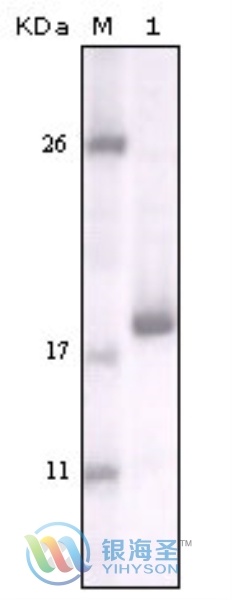AMM4921-61
[Monoclonal Antibody]
DDR2 Mouse Monoclonal Antibody

www.yhsbio.com
market@yhsbio.com
support@yhsbio.com
+86-21-54651191
Room 703,Building 6,333# Guiping
Rd.,Xuhui District,Shanghai,China
market@yhsbio.com
support@yhsbio.com
+86-21-54651191
Room 703,Building 6,333# Guiping
Rd.,Xuhui District,Shanghai,China
DATASHEET
| Species: | Mouse |
| Applications: | WB IHC ELISA ICC |
| Immunogen Range: | A purified recombinant fragment of human DDR2 expressed in E. Coli |
| Clonality: | Monoclonal Antibody |
| Isotype: | IgG1 |
| GENE ID: | 4921 |
| Swiss Prot: | Q16832 |
| Synonyms: | TKT, MIG20a, NTRKR3, TYRO10 |
| Purification: | Affinity chromatography |
| Storage: | Store at -20°C or -80°C in PBS with 0.02% sodium azide and 50% glycerol. Avoid freeze/thaw cycles. |
| Background: | DDR2 (discoidin domain receptor family, member 2) is one of the largest families of proteins in eukaryotes. The family has been classified in 8 major groups based on sequence comparison of their tyrosine (PTK) or serine/ threonine (STK) kinase catalytic domains. Receptor tyrosine kinases (RTKs) play a key role in the communication of cells with their microenvironment. These molecules are involved in the regulation of cell growth, differentiation, and metabolism. In several cases the biochemical mechanism by which RTKs transduce signals across the membrane has been shown to be ligand induced receptor oligomerization and subsequent intracellular phosphorylation. This autophosphorylation leads to phosphorylation of cytosolic targets as well as association with other molecules, which are involved in pleiotropic effects of signal transduction. RTKs have a tripartite structure with extracellular, transmembrane, and cytoplasmic regions. This gene encodes a member of a novel subclass of RTKs and contains a distinct extracellular region encompassing a factor VIII-like domain. Alternative splicing in the 5' UTR results in multiple transcript variants encoding the same protein. |
| Caculated MW: | 97 kDa |
| Observed MW: | Refer to Figures |
| Applications: |
WB 1:500-1:2000 IHC 1:200-1:1000 ICC 1:200-1:1000 |
| Reacitivity: | Human |
For research use only. Not intended for diagnostic or therapeutic use!
Additional information
